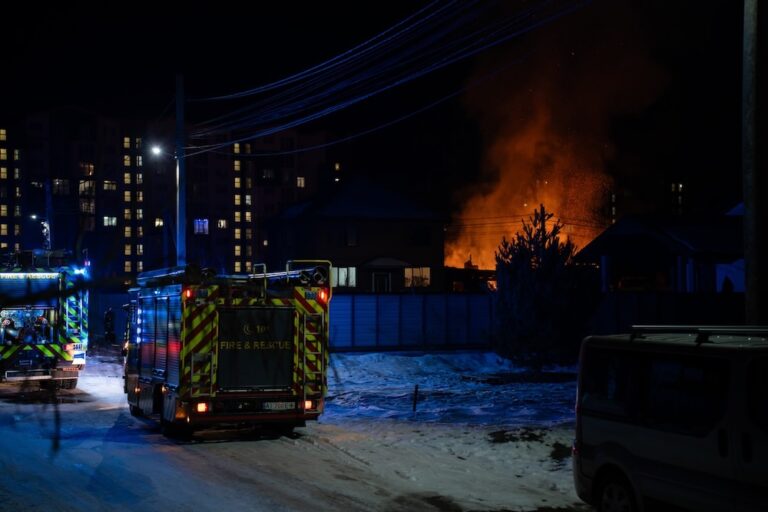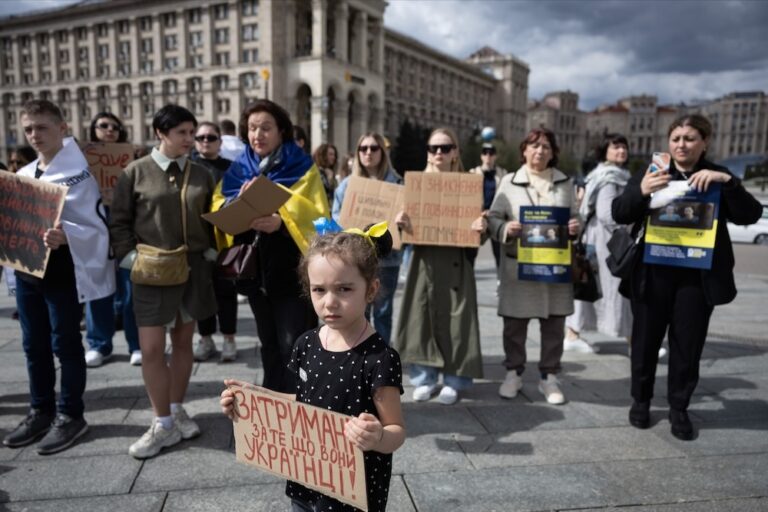**Includes new cases. For background to previously- reported case, see IFEX alerts as noted in text** In a 10 July 1996 letter to Ukrainian authorities, the full-text of which is included below, the CPJ expresses concern at attacks against journalists in Simferopol and Sevastopol, at reports of serious incidents which threaten press freedom in the […]
**Includes new cases. For background to previously-
reported case, see IFEX alerts as noted in text**
In a 10 July 1996 letter to Ukrainian authorities, the full-text
of which is included below, the CPJ expresses concern at attacks against journalists in Simferopol and Sevastopol, at reports of serious incidents which threaten press freedom in the Crimea, and at several past cases which remain unsolved.
The letter includes details on:
– authorities’ criticism of Trans-M-Radio and the pressuring of
journalists in the Crimea around reports and accounts of a
colleague’s June 1996 death;
– the May 1996 arson of the home of Anna Konyukova and Viktor Sosnovsky, Crimean bureau correspondents for the independent Russian television station NTV, and threats against them:
– the Sevastopol city administration’s June 1996 targeting of the local newspaper “Vecherniy Sevastopol”;
– the reported abuse by police in June 1996 of Express-Chronicle stringer Alexander Spakhov;
– the failure of local authorities to prosecute the 1995 murder of Vladimir Ivanov, editor-in-chief of “The Glory of Sevastopol” (see IFEX alerts of 21, 20, 19, 18 and 14 April 1995);
– police inaction in the 1993 robbery of equipment from
independent radio station Ostrov-Krym;
– the lack of resolution of Interior Ministry Troops’ 1991 attack
on Vyacheslav Savchenko, Crimean correspondent for Moscow News;
– the recent monitoring of telephone calls and intimidation of
journalists in Simferopol.
Similar appeals can be sent to authorities as indicated. The full
text follows:
“The Committee to Protect Journalists (CPJ) is writing to express its grave concern about attacks against journalists in Simferopol and Sevastopol. A number of serious incidents that threaten press freedom have been reported by correspondents in the Crimea in recent months.
Furthermore, several past cases continue to remain unsolved, notably the murder of editor Vladimir Ivanov, about whom
CPJ wrote to you last year.
“As an organization devoted to defense of its colleagues around the world, CPJ is concerned that law-enforcement agencies on the Crimean peninsula are failing to investigate and prosecute serious attacks on journalists, many of whom are either ethnic Russians or reporters for Russian-based media outlets.
Most disturbing, some reports indicate a police complicity in attacks and an attempt to intimidate correspondents both from covering the political controversies of the Crimea and from reporting on threats and attacks on the media itself.
“On June 22 (1996), Trans-M-Radio producer Alexander Motrenko, an editor of musical programs, died in the hospital six days after a clash with a uniformed police officer who allegedly assaulted him. While the attack does not appear to be related to his professional activities or to his employer, CPJ is concerned that his colleagues at the radio are fearful of reporting their independent version of the tragedy based on the eyewitness account of another radio station employee, Mikhail Sukhoikov.
While Motrenko lay in a coma, Maj.-Gen. Mikhail Kornienko, Chief of Administration of the Ukrainian Interior Ministry in the Crimea, criticized Trans-M-Radio for its critical reporting of the story, claiming that the radio station was violating press laws and was inciting the public against law-enforcement agencies. Motrenko’s colleagues now fear retaliation if they come forward with their account.
In addition, police have pressured the radio’s employees not to speak publicly about the incident and have forced at least one employee to sign a sworn statement that Motrenko was beaten not by a uniformed policeman but by unidentified persons.
“Repeated reference has been made to press laws governing coverage of crimes under investigation, although there is apparently nothing under the law preventing a news organization from engaging in an independent investigation of a homicide.
“In the early morning of May 11, an unknown person set fire to the apartment of Anna Konyukova and Viktor Sosnovsky, Crimean bureau correspondents for NTV, Russia’s only independent television station. The husband and wife team had recently been warned by police for transmitting critical reportage.
A flammable substance was poured over their doorway and ignited; the journalists smelled smoke at 12:10 a.m. and called the police after snuffing out the flames. The police did not immediately respond and at 1:30 a.m., the intruders returned and set fire to the doorway again. Police officers who finally arrived did not pursue an investigation, although on June 16, 1995, the correspondents’ balcony had been torched in a similar manner and the police had been summoned. The officers confirmed that the same flammable substance, impervious
to water, was used in both attacks. But ultimately police
pressured the NTV journalists to sign a statement that they had no claim against police investigators and that the case should be closed because no suspects could be identified.
“For several months prior to the May 11 attack, the NTV
correspondents had been investigating a series of publications in Ukraine alleging Russian espionage in the region, which is the
site of the Black Sea Fleet, an issue of contention between Russia and Ukraine.
In April, the couple was summoned to the head of the Ukrainian Security Service in the Crimea, informed that their
activities were undesirable, and warned by a peculiar — and false — analogy: “The CIA arranges car accidents for journalists who dig where they shouldn’t.”
“On May 9, Victory Day, Konyukhova and Sosnovsky filmed a group of Russian survivors of a World War II siege, bearing Russian flags, who attempted to join an official parade organized by local officials in Simferopol. The Russians were refused entry to the march, and were beaten and pushed away by riot police. The NTV team then noticed that they themselves were being filmed by plainclothes agents who warned them against attempting to broadcast their footage of the clash. Despite the admonition, they sent their pictures by relay to Russia, but the footage failed to arrive although the original cassette was in good condition.
“The NTV administration in Moscow protested the arson attempts. But the Ukrainian authorities responded that NTV was staging the incidents to increase its ratings. “Express-Chronicle, an independent Moscow-based news agency known for its coverage of opposition movements, reported on June 25 that the Sevastopol city administration issued a press release on June 15, critical of the local newspaper “Vecherniy Sevastopol” [`Evening Sevastopol’], and stating that the authorities would seek the newspaper’s closure for alleged violations of the press law. Editors of `Vecherniy Sevastopol’, known for its opposition to city authorities, believe they are being targeted for their critical coverage of social and political controversies.
“On June 14, Alexander Spakhov, a local political activist working as a stringer for Express-Chronicle, was reported by the agency to have been detained and abused by police. Spakhov was reported to have attempted to photograph a police barricade around Sevastopol’s Nakhimov Square, which had been cordoned off by police two hours before an unsanctioned rally was scheduled to begin. After Spakhov photographed the statue of Nakhimov surrounded by police, he was detained by officers of the Berkut Unit on the order of Officer Yury Korostienko. Police refused to acknowledge his credentials from Express-Chronicle or to note his Russian citizenship. Spakhov was reportedly shoved into a police
car, where policemen choked him by pulling on his tie, and punched him in the face. He was then brought to the Lenin District of the Sevastopol Interior Ministry, detained for three hours, and then released.
“Journalists continue to remain concerned about the failure of
local authorities to prosecute the murder of Vladimir Ivanov,
editor-in-chief of `The Glory of Sevastopol’, fatally injured on
April 14, 1995, when a bomb, triggered by remote control, exploded in a garbage can outside his home. Ivanov was an ethnic Russian and his paper’s editorial position supported greater autonomy for the Russian population of Crimea.
Shortly before his assassination, Ivanov had begun a campaign in his newspaper denouncing the Crimean mafia and protesting the construction of an oil refinery by a Ukrainian-Swedish company. His newspaper had also published several articles supporting the creation of a free trade zone in Sevastopol, a plan that was expected to strengthen Crimean autonomy. To date, no suspects have been arrested and local journalists who have attempted to query police have been warned to stop their investigation.
“In 1993, expensive equipment was stolen from an independent radio station, Ostrov-Krym. Although the police eventually recovered the stolen equipment, they then claimed that the items disappeared from the police investigator’s office and made no further efforts to recover the stolen goods. Crippled by the loss and other difficulties, the radio station eventually went out of business.
“In August 1991, Vyacheslav Savchenko, Crimean correspondent for Moscow News, was attacked by soldiers from the Interior Ministry Troops as he attempted to cover the failed coup attempt in Foros, site of then-President Gorbachev’s dacha [summer home]. Some of his teeth were knocked out in the assault and he suffered permanent damage causing a speech impediment. His repeated efforts to bring his attackers to justice have met with indifference and warnings to desist from local authorities.
“A number of journalists in Simferopol have noticed that their
phone calls are being monitored and their telephones are sometimes shut off. In repeated attempts to phone journalists who have reported attacks, CPJ’s conversations were also cut off.
“The accounts of intimidation outlined above indicate that
authorities in Ukraine are acting contrary to international law
and practice regarding press freedom. Article 19 of the United
Nations Declaration of Human Rights guarantees the right of
journalists to receive and impart information freely regardless of frontiers. Article 10 of the European Human Rights Convention protects the dissemination of any types of information, including opinions, ideas, philosophical arguments and political commentary.
The decisions of the European Commission of the Council of Europe and the European Court of Human Rights affirm the rights of journalists to cover the news critically, and in particular, to investigate crimes using their own sources and to report on the course of the administration of justice (e.g. the case of The Sunday Times, 1979) and to subject the actions of the government, including police, to scrutiny (e.g. Prager/Oberschlick, 1994).
“We urge you to investigate these and any other allegations of
attacks on journalists and press freedom in Sevastopol and
Simferopol and to make the findings of your investigation public.
We call upon you to see to it that those who have attacked
journalists with impunity are promptly brought to justice.
Finally, we urge you to ensure that law enforcement agencies are enjoined to cease intimidation of reporters for both their news coverage and investigation of attacks on the media itself. Such attacks and a growing climate of intimidation are ill-suited to a country such as Ukraine which has endorsed the value of press freedom in international agreements and has aspired to join the world community of democracies.
“Thank you for your attention to these matters. We await your
comments.”
Similar appeals should be sent to:
His Excellency Leonid Kuchma
President
Office of the President
Kirov Street no. 6
Kiev, Ukraine
Fax: + 70 44 293 1001
Major-General Mikhail Kornienko
Chief of Administration
Ukrainian Interior Ministry in Crimea
Fax: +380 652 296 861
the Ukrainian diplomatic representative to your country
(in Canada)
Embassy of Ukraine
331 Metcalfe Street
Ottawa, Ontario
K2P 1S3 Canada
Fax: +1 613 230 2400
to your diplomatic representative in Ukraine
(United States diplomatic representative)
William Green Miller
U.S. Ambassador to Ukraine
Fax: +7 044 279 1485
Please copy appeals to the originator if possible.


